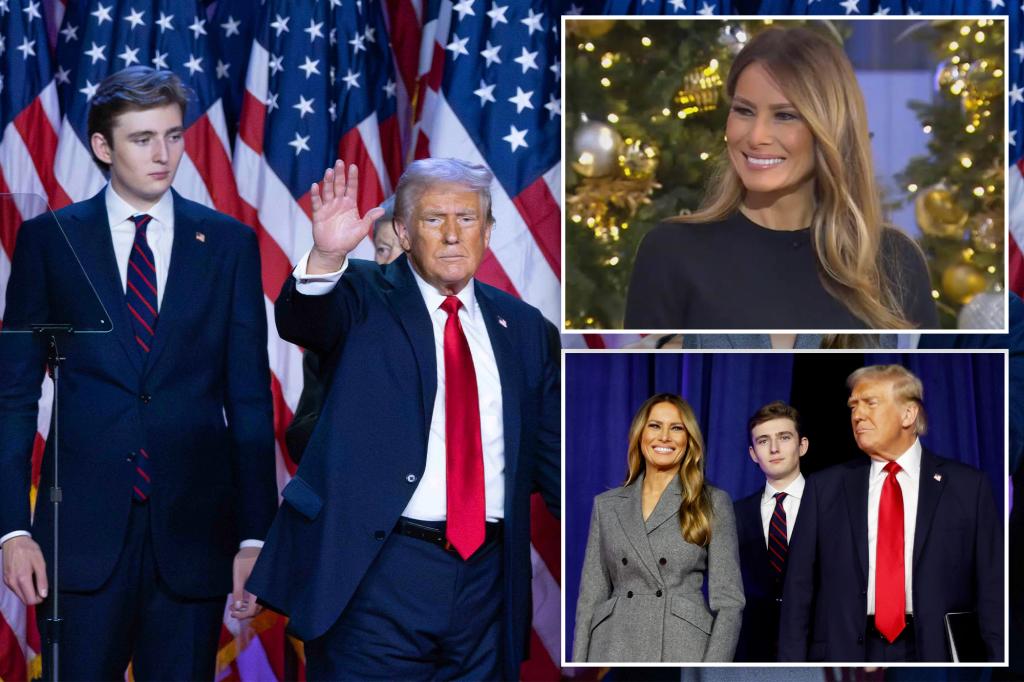Barron Trump, the youngest son of former President Donald Trump, played a pivotal, albeit behind-the-scenes, role in his father’s 2024 presidential campaign. Melania Trump, the former First Lady, revealed in an interview that Barron, acutely aware of the media consumption habits of his generation, advised his father to engage with internet personalities and podcasters to reach a younger demographic. This strategic move proved instrumental in broadening Trump’s reach beyond traditional media outlets, allowing him to connect with a segment of the electorate often overlooked by conventional campaign strategies. Barron’s understanding of the digital landscape and his ability to identify key influencers, such as Joe Rogan, provided his father with a crucial advantage in the race against incumbent Vice President Kamala Harris.
Barron’s advice to engage with new media platforms reflected a generational shift in information consumption. He recognized that young voters were increasingly turning away from traditional television and newspapers, instead favoring online content, podcasts, and streaming services. This insight prompted Donald Trump to appear on popular podcasts like the “Joe Rogan Experience,” a long-form interview format that allowed for in-depth discussions and a more personal connection with listeners. This contrasts sharply with Harris’s approach, which appeared to underestimate the power of these platforms. Her limited engagement with podcasters and her campaign’s apparent lack of a robust digital strategy may have contributed to her inability to effectively connect with younger voters.
The success of Trump’s podcast appearances, specifically the Joe Rogan interview, underscored the effectiveness of Barron’s advice. The extended conversation with Rogan provided Trump with a platform to articulate his policies and engage in unscripted dialogue, reaching millions of listeners just days before the election. Conversely, Harris’s limited podcast appearances, including an interview on the popular “Call Her Daddy” podcast, failed to generate significant online traction. This disparity highlights the Trump campaign’s strategic advantage in leveraging new media platforms to connect with a broader audience and potentially sway undecided voters.
Beyond his strategic contributions to the campaign, Barron Trump navigated the unique challenges of being the son of a president while simultaneously embarking on his academic journey. He commenced his freshman year at NYU’s Stern School of Business, a prestigious institution located in the heart of Manhattan. However, his college experience was far from typical, constantly shadowed by the ever-present Secret Service detail. Melania Trump acknowledged the difficulties her son faced in maintaining a semblance of normalcy while under constant protection, yet she expressed pride in his resilience and adaptability.
Melania Trump praised Barron’s strength and maturity in handling the pressures associated with his unique position. She emphasized the importance of pursuing his dreams and remaining true to himself despite the extraordinary circumstances surrounding his life. The former First Lady’s words reflected a mother’s unwavering support and encouragement for her son as he embarked on adulthood in the public eye. While Barron’s college experience was undoubtedly different from that of his peers, his ability to navigate this unique environment speaks to his character and adaptability.
Barron Trump’s influence on his father’s 2024 presidential campaign demonstrates the growing importance of digital media in modern politics. His recognition of shifting media consumption patterns and his identification of key online influencers allowed the Trump campaign to connect with a crucial demographic. This strategic approach, coupled with Donald Trump’s willingness to engage with new media platforms, provided a significant advantage in the race against Kamala Harris. While Barron navigated the complexities of college life under the watchful eye of the Secret Service, his contributions to his father’s campaign highlight his understanding of the digital landscape and his ability to leverage it for political gain. His story exemplifies the increasing influence of the younger generation in shaping political discourse and campaign strategies in the digital age.










